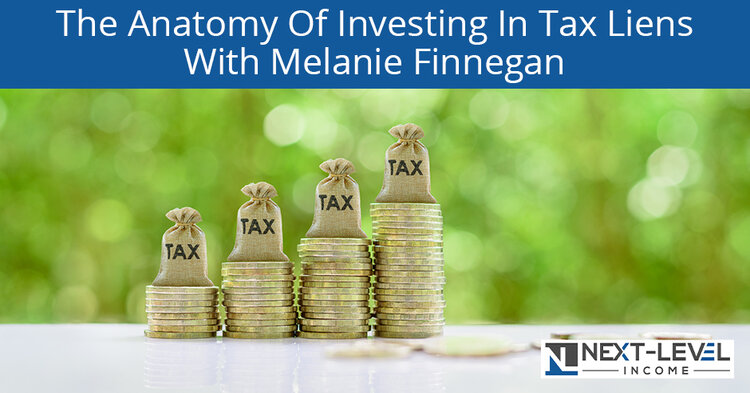Subscribe to The Next-Level Income Show
Listen To The Podcast Here:
The Anatomy Of Investing In Tax Liens With Melanie Finnegan
On our show we have Melanie Finnegan, the Founder of Tax Lien Wealth Solutions, and started her career in tax liens in 2008. She perfected her taxing strategy in 2013 and started Tax Lien Wealth Solutions in 2017. She’s the first female to become a Certified Tax Lien Professional by the National Tax Lien Association, the governing organization over the tax lien industry. Melanie, welcome to the show from Utah.
Thanks, Chris. It’s good to see you.
It’s good to see you as well. We were talking about how great it is that things are starting to open up here again after everything and how wonderful it is to see people face-to-face and in-person but this is going to have to do. Melanie, for those who haven’t listened to you before, haven’t seen Tax Lien Wealth Solutions, please share with the audience what your background is and how you got to where you are.
For anybody, if you guys don’t know what a tax lien is or tax lien certificate investing, it is governed by the government program. The government is entirely in-charge of this. It’s our property taxes. We got to pay them. We have fourteen billion delinquents here as a nation. If we don’t get those property taxes paid by the property owners then we have tax lien investors as myself or institutions like Bank of America. They go to these annual auctions. That way, these counties and things, we don’t have them belly up or we don’t have a national crisis on our hands because we created this in 1800s and it works. It’s a claim against the property for unpaid property taxes.
For the audience, tell us how did you learn about tax liens for the first time and then found your company. How did you decide to do that?
This is crazy. It reads like, “What’s the girl in Utah doing property tax lien investing in Florida and on the East Coast?” It was a happy accident. I was looking for a job years ago. I needed to put food on the table for my son. I was a single mom. I walked into a place and it was similar to what I do and not quite similar. It changed my life forever. It was the opportunity of a lifetime. I took it and ran. I fell in love with that part of me that was eager to play with the numbers and create a strategy. I learned how I was good at traveling and presenting. I found my inner nerd and I focus on being an asset to the clients. I’m not a salesperson, I’m a human connection person. That’s why I thrive well at the other company. You were meeting so many different walks of life and then because of those relationships, you want to work your decorum and make sure you’re an asset to them.
You got started with another company then you branched out on your own, is that correct?
Yes. I saw some things I didn’t love and I left. I went into the IT field. I was the face of their company, I knew it inside out, and I thought, “This is crazy. This is what I love. I didn’t love working with network engineers and speaking load balancing lingo.” Here I am. One day, I said I’m doing this and I did it.
What were you doing before you entered into the tax lien industry?
I wasn’t doing much. I was but as I said, I was a single mom for all of Brayden’s life. I was working not a good job so I didn’t have that confidence that said, “Go out and go find a career.” I didn’t go to college. I didn’t know anything yet. I was like, “I’ll be a bartender. I’ll be a waitress.” I made good money but it wasn’t conducive to a good lifestyle. I wasn’t fulfilled. When you’re a single mom, I was very much stereotype but I knew how to get out of it and I did.
Tell us how you founded Tax Lien Wealth Solutions. What’s your business model? How do you find a tax lien? How do you make money off of it? We’ve had some experience in nonperforming notes so I’d love to hear about how it’s different than a note whether it’s a 2nd or a 1st mortgage.
I don’t usually always talk about them but they are similar. What had happened is I branched out and I don’t want to step on toes here whether a seminar and he’s out there that overcharge for education. I see all these people going into these debts and things for education. I was like, “I don’t want to charge and put a value on me. I want to put a value on the investment.” This is an institutionalized investment and I wanted people like me to be able to get in this investment. I’m passionate about it. I racked my brain and put together what I wanted to do for my clients. I buy on the secondary market. That’s from the large institutions. I have tax lien brokers. They go out and book for deals for me because of my affiliate and certification. I buy them in bulk. I parceled them off, we assigned to clients and get it good money.
About how many are you buying at a time, Melanie?
About $1 million every other month but sometimes I need inventory and need to grab $200,000 or something. I buy it in bulk and I get a small discount there. I don’t pass that on. We transfer them to the client’s entity name or taxpayer and we go from there.
Let’s say I’m an individual. I say, “Melanie, I want to go out and buy a tax lien.” Walk us through the anatomy of a deal. One deal, for instance, if I’m going out and looking to buy this. How would I do that?
Let’s tell the story. I’m going to pretend you’re the property owner and I’m the investor. Chris Larsen was the property owner. He doesn’t pay his taxes for the year 2016. This is serious. Everybody should pay attention to this because we, property owners, don’t play Russian roulette with your home.
I got my tax bill right here in front of me. I’m looking at it. I assure would not like to pay it but I don’t like what’s going on if I don’t.

Investing In Tax Liens: As a tax lien investor, a tax lien certificate usurps everything, mortgage, or any liens on the property. You trump them all.
You jeopardize if you don’t pay it. In 2016, he doesn’t pay it. I decided to go to the 2017 annual auction. I’m the investor, I’m going to bid on that property and I’m going to bid on the certificate attached to that property. It’s a $1,000 bill. The interest rate is 18%. I’m going to accrue the interest because there’s a grace period. Chris Larsen gets his taxes paid for free because he’s accruing interest paper. The penalties are all on paper but it has a two-year grace period before the property has any threat to it whatsoever. I call it the tax lien gamble. A lot of investors do this. They’re going to sell the property or developers for land. They hang on to it.
They allow all of us investors to pay the property tax bill, they sit there, and there’s no threat. Melanie comes in and buys it. It sits for two years if I’m going to be on the primary market. I initialized foreclosure on two years in day one. If Chris wants to keep his property, what does he do? He has to pay his tax bill. If the hammer is down once I filed that tax lien application, step one in foreclosure, I’m a maximized investor, you’re accruing interest as the owner. Eighteen percent a year is a lot. I am reaping the rewards. It’s like bad credit card rates.
At that point, I have the chance to pay them back taxes, pay you the interest rate and then keep my property.
Nothing comes facilitated through the investor and the property owner. It’s facilitated through the county. The county does this and everything goes through the county, it runs through the county, money is run through the county. The county has never out any money. They facilitate the deal. I always say, “What is the one thing that the government is the best at?” It’s getting paid.
Yes, because they got force to back them up.
What they’ve done for us as investors, they’re saying, “Thanks for taking the risk. We need these funds. We’re going to reward you with not only the 18% interest or whatever your state interest is, but we’re also going to allow you or enable you to usurp.” You, as a tax lien investor, a tax lien certificate usurps everything, mortgage or any liens on the property, you trump them all. The only thing you don’t is federal tax, the income tax that’s attached to the property. That’s the only thing. The feds get that money too.
That’s how they entice us. That property owner, Chris Larsen, says, “I can’t pay my tax bill. I don’t know what to do.” You either better beg, borrow and steal because of the moment that that property gets scheduled for deed auction. The investor will not get it immediately. It gets scheduled for a deed auction. The minimum bid is the investor’s investment plus interest in penalties. You get redeemed that way or if it’s not bid on at the auction, me, the investor Melanie, gets the property.
There are a few things in there, Melanie that I want to unpack. First off, do you buy in Utah? Do you buy locally? Do you buy all over the country?
I buy on the East Coast but my main baby is Florida. Florida is about $500 million a year on delinquencies. They make it work for the investor. They have tips and tricks. Part of my strategy that I created and why I started my business was because of Florida.
Why is that?
They have secrets. They allow you to change your estimate when you file. They allow the yield and the interest yield to become higher or more increased. Once you file for foreclosure, there’s an incentive that kicks in. They’re saying if you file a foreclosure, I’ll maximize your investment but nobody does it. I am the only one in this space that does this but nobody wants to do it like this. It’s crazy because I compound interest that way. I get redeemed, I turn around, take the principal and interest and throw it back out there.
No matter what, I try to turn it twice but I will get it at least once a year turned so, we’re getting that interest at least working for you in that year. As things go along and we create some cyclical investment when you’re in the investment longer, you’re going to have a waterfall of funds where you’re going to create cashflow if you want. We work the money hard. If we have a stopping point, “In five years I want to replace my wife’s income.” We meet that goal. Five years at the exact minute, but not all the time. I try my hardest, I’m not perfect, but staying close to meeting goals by utilizing the strategy.
If I heard you correctly, I don’t pay my tax bill and the government says, “We need somebody to pay it.” You come in as the investor and provide that bridge until my two years runs out. Is that an accurate way to look at it?
Yes.
When we were buying nonperforming notes, one of our goals was to keep the owner in the house to work out a plan. A lot of times we said, “You owe this.” Let’s say they owe $100. We bought the note for $20. We might take $40, save them a bunch of money off the original write-off that the bank had, but it still multiplies our money by two which was a good return. How do you work with property owners to make sure that they can keep their property? You said you do go to foreclosure sometimes. How does that work?
I don’t want to be the bad guy but I had to make a decision because part of my heart on my sleeve and it’s also completely something I didn’t want to do is kick people out of their homes and do all of this. As I pondered and reflected, I’m also a businesswoman, I have to be on my client’s side. I have to be in the best interest of my client regardless. I’m like, “I’ll foreclosure. I don’t keep people in their properties.” They have their property tax bill paid for at least two years. There could be multiple liens on there that I’m going to have to throw my money out on as the investor. We filed foreclosure the moment we can but this is the key component to tax lien investing.
I don’t know what the success rates are on notes. I’d love for you to share with me. On tax lien investing, it’s 99.9% of the time to get redeemed. The definition of that is you’re going to get your principal plus your interest. That just shakes the money lose. These property owners are waiting for you because there’s a statute of limitations on the certificate, seven-year life. If it expires then the property owner got their property tax bill paid by me, the investor. You’re welcome but we don’t let them expire.

Investing In Tax Liens: 401(k)s take us to bed at night. They make us do good for a while, but all they do is tucking us in. They are not going to enable us to live or sustain our lifestyle.
That’s not a good investment. First off, know that the percentages aren’t that high in notes especially we were looking in not just the primary space but also the secondary nonperforming notes like lines of credit. I’m looking here and I’m thinking like 18%, 99.9%-plus of the time you get paid off. Melanie, your company helps people if they want to learn how to do that, is that correct?
I have this fierce passion and tax liens need to be a part of our alternative investment portfolio. I don’t like 401(k)s. They took us to bed at night. They make us do good for a while but all they do is tucking us in. They are not going to enable us, live, or sustain our lifestyle. We have to convert that IRA to a self-directed IRA and learn about these alternative asset classes. If you don’t do tax liens, do something because it’s scary. I got started late in the game. I’m scrambling because now I know how important this is. I want to sustain my lifestyle. It’s not lavish or anything like that. When I get to 60 years old, I want to be able to get out there and play still. I see people on there either going back to work again and I don’t want to do that. Neither should any of us. We got to look at alternative asset classes.
You said a couple of things in there, Melanie, that we’ve had prior guests on the show. We had American IRA, Sean McKay, talking about how to set up a self-directed IRA and how you can use your IRA funds to invest in things like this and also invest in multifamily real estate. A lot of our investors do. Also, Damion Lupo who teaches how to set up what’s called a QRP. The same thing where you can self-direct your funds through there. Check out those previous shows if you want and figure that out. It is impressive.
One of the reasons I wanted to have you on, Melanie, is because the Next Level Income strategy is number one, how to make more money. You teach people how they can do that themselves. Number two, keep more money and then grow their money. For people that either wants to learn how to do this themselves or they say, “That’s great but I’m a doctor or I’m a professional. I’m already doing well.” I’d like to do this passively. Is there a way that you help facilitate that?
We have a couple of different programs. We have the hands-on investor and hands-off investor. The hands-off investor, the minimum is significantly higher. We have a minimum of $50,000 and I manage it for 24 months. You don’t have anything to do with it. You don’t do anything. That’s the guy that they call and say, “I’ve got my IRA. I’m busy. I am a doctor. I don’t want to do this but I don’t want anyone to be passive on this investment.” You would be like, “This isn’t worth my time if I’m going to be passive.” You would want to be either handed over to me or be well-educated enough that learning portal with all the resources in there.
We get you certified in there. Once you’re certified, you can have a portfolio manager and you’re hands-on with your investment. It’s insignificantly you can invest a $500 investment if you want. It’s lower. You can let the investment earn your trust that way. I always tell people, “Hold on.” They’ll say, “I have X amount of dollars.” I’ll say, “Let the investment earn your trust first because otherwise, you’re going to be calling constantly.” I had to let the investment or my trust, I should treat my clients the same way. I liked that the lower portal is part of it but you got to know you have access to our portfolio managers and all the resources inside of there.
That’s one of the big things we do is putting all that education out there. Our investors can not only learn how to do it and learn the ins and outs but they can also participate in the gains of the back end even if they want to be passive.
Get educated. It’s better to do that.
I love Utah. My uncle still lives in Colorado but I started going out there when I was eleven years old skiing. We did river trips out there and a group of friends. Back in 2018, we did Grand Canyon.
I did that. Didn’t I tell you that?
I want you to tell the audience a little bit about some of your adventures outside. This is one of the great things. It’s having money and financial independence, it’s not about checking your bank account every day. It’s about doing what you want to do and having experiences. Tell the audience a little bit about some of the coolest stuff you’ve done in 2020.
I’m an outdoor enthusiast. I always say don’t tell people how wonderful Utah is because it is. We’re covered in mountains and we’re speckled. I went to Lake Powell three times this 2020 which I don’t know if your audience knows about Lake Powell but it’s rad.
We spent a week there camping.
On Wednesdays, I had a half-day in school and we would go snowboarding. A lifestyle meant for me if that makes sense. It fits me. My backyard is mountains. Golfing up in the mountains. Now it’s starting to get cold and we get the snow and stuff. In order to love Utah, we’ve got to be okay with the cold too. We do a lot of fun stuff. We went zip lining at Sundance. That was fun because I barely did that. It’s the zip line in the nation. It had five platforms in the mountains. We have a cabin up at Brighton Resort, you’ve skied there. We go up there and ski-in and ski-out. That’s a family cabin and we feel lucky.
The big thing I always say is you can have it all. You can have it off. People say, “You can’t have it all. You can’t have a career.” You can have a career, a family, you have your own life, and do all these things. You can do it all and that’s what our mission is. Melanie, your proof to there. That being said, one question we ask everybody that’s on the show is if you can go back to your 25-year-old self and give yourself one piece of advice, what would it be?
Confidence and trust in yourself. I had zero confidence because I didn’t go to college. I had my baby young and I thought I wasn’t good enough to apply for those jobs that could take me to a next level. I settled for a lot of years. I find every lesson is awesome. I’m grateful for it but I would tell myself, “You’re good enough. You need to build your own confidence.” Nobody can build your confidence for you. It’s all about you.
As I talk about in my book, it gave me the confidence to do a lot of things. That was a soft, not so athletic kid. That was intelligent until I found cycling, found something that I was good at and had a network of people, it helped propel me. I love that, Melanie. Your story is an inspiration. We love what you’re doing. At Next Level Income, we love other platforms that help teach education and also give opportunities. If someone wants to learn more about what you and Tax Lien Wealth Solutions does, where can they find you?
There are a couple of different places. I want to say that you’re going to be my first show I’m saying this on. We have 30,000 followers on our Facebook page. I don’t even know how it happened. I don’t engage and I feel bad but I’m like, “It’s the last thing I want to do.” One of my employees, Howard, you heard me talking to him. He is an inspiration to me. He is pushing me to a new level where I’m putting myself out there because I sometimes get a little self-conscious, I don’t want to be in these videos. We’re starting a weekly five-minute video on our Facebook page where we’re going to do one question at a time and we’re going to start something there. Facebook is one. My website is TaxLienWealthSolutions.com. We have tons of action buttons that ask for us if you want to contact us, you can see it right there. That’s the best place but go to the Facebook page if you want to learn more and see us more.
Check out Melanie, check out Tax Lien Wealth Solutions and her out on Facebook. You can also check us out at NextLevelIncome.com. You can get a free copy of our book. Melanie, I’ve enjoyed our conversation. I love what you share with the audience. I love your story, the inspiration, and showing everybody that you can have it all, you can live in a beautiful place, you can have financial independence, and you can help other people achieve the same thing. Thank you for being on the show.
Thanks, Chris.
Important Links:
-
Sean McKay – Past episode
-
Damion Lupo – Past episode
-
Facebook – Tax Lien Wealth Solutions
About Melanie Finnegan

Melanie manages the daily operations of the company, portfolio management, and portfolio consulting. She has been investing, educating and assisting clients in becoming successful in the tax lien investing industry for over 10 years. Her commitment to her relationships and client successes are the drive behind this company’s foundation.


Subscribe to The Next-Level Income Show